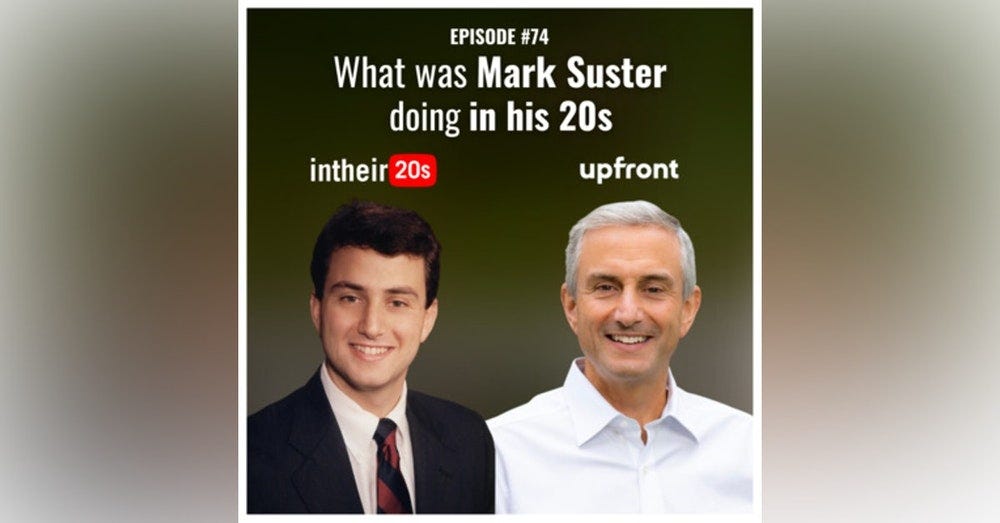Mark Suster - Pull Not Push
Hi everyone 👋,
The best way to support this project and never miss an update is with your email :)
“None of my high school friends would of predicted my success”
Mark Suster is a successful entrepreneur multiple times over and a partner at one of the world’s top venture firms, Upfront Ventures. He made his way here not with a solidified plan, but by feeling his way through life, sticking to his gut, and finding mentors.
He spoke with the inTheir20s podcast and shared some great advice:
Getting what you want
Doing what feels right
Pros and Cons of getting an MBA
Betting on yourself
“If you don’t ask, you don’t get.”
Mark Suster learned this piece of advice while working as a strategy consultant at Accenture after college.
This is exemplified in a time when Suster wanted to travel abroad for work. He first directly asked his boss directly if he could help him get in the right group to do this - he didn’t help. So instead he began networking with people who lived abroad and found someone that led a group in France. Suster flew to Chicago to meet this man at the airport… He ended up working in Europe for 11 years.
What can be learned here is that the key to leveling up is finding someone outside your current company that likes what you have to offer and wants to pull you in, rather than pushing your current organization to open up new opportunities for you.
Suster’s observation is that the world works in a pull direction not a push direction.
Following ~ 6 years at Accenture, Mark Suster opted to obtain an MBA from the University of Chicago. The pros and cons of getting an MBA have been argued over for decades. If you yourself are trying to decide if an MBA is right for you, Mark Suster offers this framework:
Curriculum, Certificate, and Colleagues VS. Cost
Certificate - i.e. the degree itself for most this is the most marketable component.
Curriculum - The business and economics education of an MBA is only valuable if your undergrad degree was in something other than business. Otherwise it will just be a repeat.
Colleagues - Those looking into an MBA should over index on the quality of their colleagues. The network built in an MBA program is its greatest value.
Cost - An MBA is very expensive and takes you out of your career for two years.
Mark Suster also argues that there are really only 8 MBA programs which are economically worthwhile.
“I had no plan for life once so ever.”
Many people in their 20s are constantly looking for the golden ticket and a framework that they can follow which will lead them to a life of success and fulfillment. However, one framework, which is essentially the anti-framework, is to simply do what feels right.
Mark Suster reached vast levels of success not by following a strict set of rules but by using his gut and instinct.
We now have the advantage of things like Youtube, podcasts, and newsletters that unlock valuable knowledge. Back in Mark Suster’s time, these things didn’t exist. He got his prerequisite knowledge from networking.
One of the biggest takeaways from over 70 episodes of inTheir20s is possibly the biggest career and life accelerator is a strong propensity for building a network.
One way to do this is through something Mark calls “50 Coffees.” Reach out to one person every week and offer to buy them a coffee. Let them know you don’t want anything other than to learn about their experiences and that it will only take 30 minutes. After a year, you will have met 50 new people and can count on at least a few to become lasting connections. Using these connections you can build a book of contacts for something called triangulation. Every time Mark is faced with a difficult decision, he calls 5-or-so of his contacts for their opinion. This helps him dial in on the right actions to take.
Mark did give two book recommendations for people in their 20s:
How to Win Friends and Influence People by Dale Carnegie
How to Swim With the Sharks Without Being Eaten Alive by Harvey McKay
“The key to my success is everybody starts things, I finish.” - Harvey Mckay
9 months before reaching partner, Mark left to bet on himself. He founded two successful companies, but constantly reminds people that entrepreneurship is not for everyone. It will be a long painful road but it will change your life.
But hey, so you want to start a company, well, Mark Suster has some advice for you.
Hire your co-founders.
If you want to start a company Mark recommends that you put in the work to write the business plan, research and test the idea, and legally form the company all before bringing on any co-founders. Once this is done interview potential co-founders offering ~20% to someone with skills your company may need but you may lack. This saves you from diluting yourself by 2/3 before taking on any funding and saves you from involving yourself with the wrong founders.
Mark gave his six life lessons in a wonderful TED Talk.


